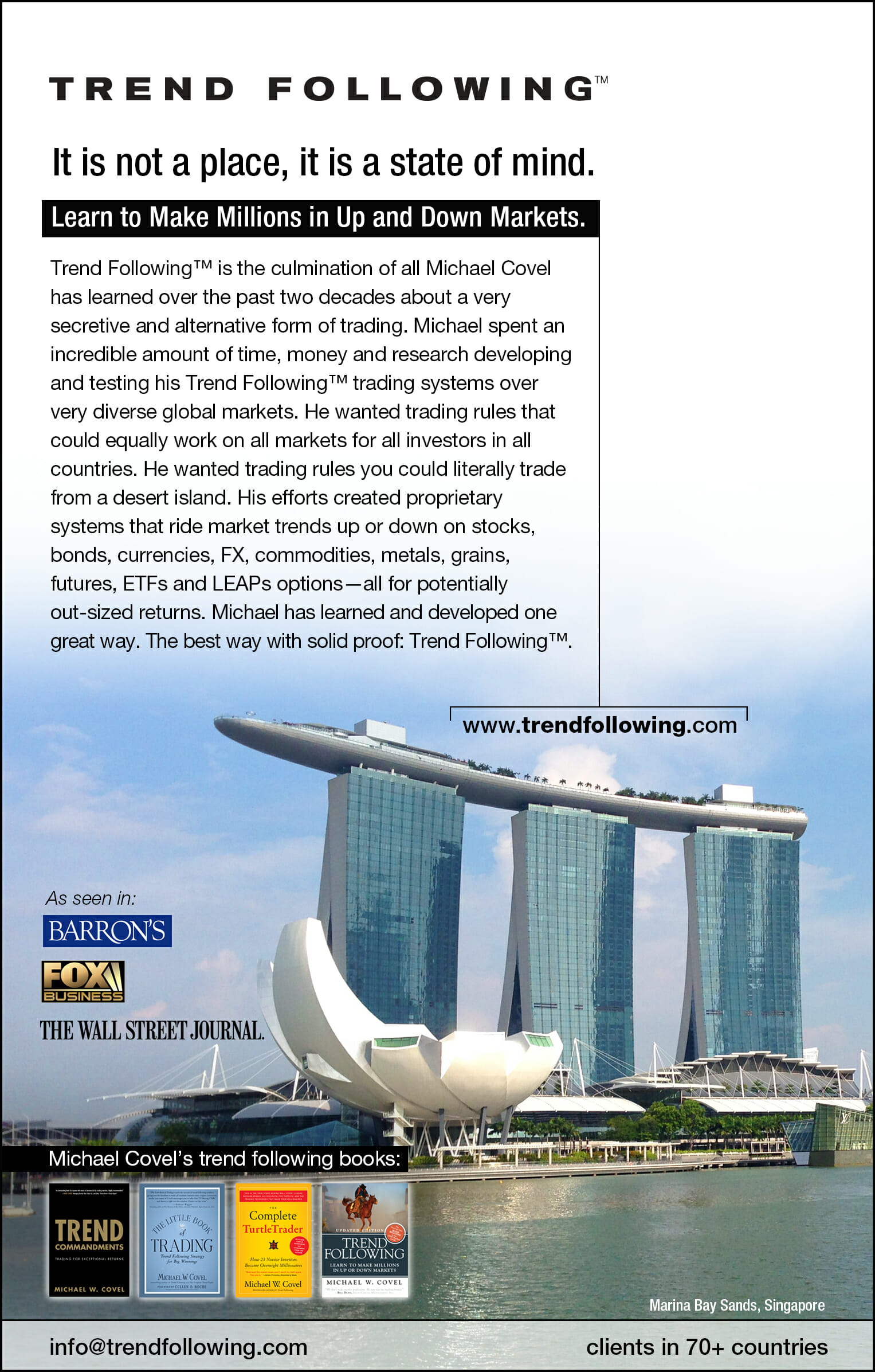Kate Welling runs a newsletter called Welling@Weeden. One of her writers Peter Deoteris recently reviewed the book Trend Following. We quickly thanked Kate for the review letting her know that in a world where so many make every controversial argument a personal bash, that it was refreshing to see an honest to goodness major difference of opinion with the Trend Following book.
First read the review from Welling@Weeden:
![]() Download Trend Following Review (PDF).
Download Trend Following Review (PDF).
Our Response & Clarification to Welling@Weeden Review
- The 3rd paragraph uses the phrase: “couple of commodities traders”. This is a misleading statement. Why? The universe of trend following traders is not simply Ed Seykota and John W. Henry (see Trend Following book). Secondly, to call them “commodities traders” discounts the vast majority of the markets trend followers actually trade. Trend followers trade stocks, currencies, bonds and some commodities too. We are not splitting hairs here — the phrase is used derisively. Many people attempt to position trend followers in this manner as it helps to protect whatever other philosophy one may have that conflicts with trend following trading.
- John W. Henry and Barings Bank were covered here at TurtleTrader years before Henry bought the Red Sox.
- Most, if not all, trend following performance data of public money managers is free to all. No special access needed.
- The 6th paragraph states, “The Asian debt collapse, the Long-Term Capital Management debacle, the 9/11 terrorist disaster, etc., he maintains were all predicted in some fashion by some super wizards.” The book does not state this. In fact, the book goes to extremes to address why prediction is impossible.
- The 6th paragraph states, “…there clearly is a strong element of revisionist history at work here. Covel is looking back and using subsequent events to justify various traders’ positions. When those positions were established, however, they were based on logic and assumed risks that were often entirely different.” The book does not state this. Trend followers took their positions with no knowledge that an event would occur. They took their positions as trends moved in one direction. The fact that those trends led to big events is not something anyone could predict. The reviewer does not seem to grasp the trend following concept at a root level.
- The 8th paragraph states, “Experience informs, however, that in practice that is one whale of an assumption.” This might be the reviewer’s most confusing statement. Why is it a whale of an assumption? Is the implication that all traders in the book Trend Following were the result of luck? Does the practice of trend following itself by many traders over the decades not count for something? Of course, we believe it is great proof of trend following trading viability. Considering the billions given to trend following traders to manage in the last few years — we are not alone in our belief.
- The 8th paragraph states, “I just hope our institutional clients know better.” We are not sure who these institutional clients are that Peter mentions, but numerous institutional clients have been embracing trend following trading on a monster scale over the last decade. And let’s face it, institutional could mean your state government pension or your corporate retirement plan. There is no doubt that many average people have money invested in trend following trading and don’t even know it! Pension plans, school endowments, etc. have been stepping up and legitimizing trend following for some time now.
- Does anyone know what style of trading Peter employs? It might help put disagreements in context. But we thank Peter for providing an opportunity to further address trend following trading confusion. We welcome additional feedback on this debate to be posted on this page.
Michael Covel comment: I definitely enjoy baseball, but to postulate I admire John Henry’s baseball over his trading is silly. I think if Peter did his homework he would recall that John W. Henry is in Michael Lewis’ Moneyball! Comparing John Henry’s trading to Billy Beane’s baseball math is not exactly a stretch considering John hired Bill James — the same Bill James whose quantitative research is the foundation of Billy Beane’s work with the Oakland A’s!
Readers Respond
Chris Walsh comment:
Some time ago I wrote to say that there is always some level of prediction involved in any technical approach to trading. You wrote back, disagreeing and referred me to your book. Thanks for that. The book is great, and at last the distinction you make between prediction and reaction made sense to me. The 2/19 post on your blog, with the attached book review reminded me of this. Alas, [Peter Deoteris] does not see the distinction either. Trend following did not predict financial and global crises. However, since trends tend to continue, traders who react to them at or near the beginning create the opportunity of being there when the trends reach their crescendos. In down-trends, these are called “financial crises”, in up-trends “speculative bubbles.” Thanks, again, for a great book.
Trend Following Products
Review trend following systems and training:

More info here.

